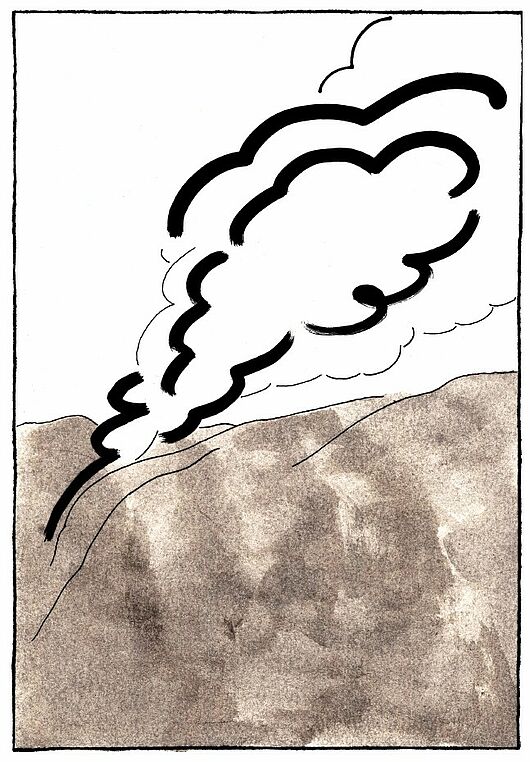Apokalypse Wo?
Markus Färber, Prof. Hans-Georg BarberEK-Pflicht, Master 2. Stj., Master 1. Stj., Bachelor 4. Stj., Bachelor 3. Stj., Summer term 2024, Normalwoche (1.-15.SW),
APOKALYPSE WO? Grafische Erzählungen von übersehenen Endzeitperspektiven.
Die Welt geht unter – vielen dürften dabei als erstes episch inszenierte Szenen aus Hollywood-Blockbustern in den Sinn kommen: spektakuläre Explosionen, Meteoriten, die auf die Erde zurasen oder Zombie-Horden in den Straßen amerikanischer Städte. Aktuell machen die immer sichtbarer werdenden Auswirkungen der Klimakrise, die wieder neu bewusst gewordene Bedrohung durch einen globalen Nuklearkrieg oder auch die Furcht vor neuen Pandemien – um nur einiges Beispiele zu nennen – die fiktionale Erwartung einer Apokalypse auch als ganz reale Erwartung und Erfahrung präsent.
Dabei lässt einen der nicht zuletzt durch die fiktiven Darstellungen geprägte absolute, spektakuläre, globale Blickwinkel leicht etwas aus den Augen verlieren: leben viele Menschen nicht schon längst mitten in einer Apokalypse oder Post-Apokalypse? Während für uns die Klimakrisen nur allmählich immer direkter erfahrbar gemacht werden, sind Menschen insbesondere im globalen Süden schon längst von der Vernichtung ihrer Existenz bedroht. Während viele aus einem relativen Wohlstand heraus über Zukünfte diskutieren, wurden indigenen Communities diese Zukunft schon lange geraubt. Auch jenseits der Wortgebenden christlichen Apokalyptik gibt es Untergangs- und Offenbarungsvorstellungen in vielen Religionen und Kulturen, oft auch mit ganz anderen Zeitvorstellungen. Neben der offenen Frage der nötigen Skala, der relevanten geographischen Dimension eines Weltuntergangs kann dieser genau so in Einzelnen verankert sein. Und: geht es bei einem Weltuntergang ausschließlich um Menschen?
Das Projekt soll in einem gestalterisch-künstlerischen Ansatz die übersehenen Apokalypsen offenlegen und reflektieren: welche und wessen Perspektiven sind kaum präsent? Welche Aspekte von Weltuntergang sind kaum im Fokus? Wie kann Apokalypse auch anders gedacht werden?
Im Verlauf des Semesters beschäftigen wir uns mit dem Medium Sach- bzw. Wissenschaftsscomic im Bezug auf dessen Möglichkeiten der Kommunikation komplexer Inhalte und entwickeln Comic-Narrationen auf Grundlage von Gesprächen mit Expert*innen und eigener Recherche. Wie ermöglicht uns das Medium Comic vielschichtige Themen sowohl objektiv als auch subjektiv zu beleuchten? Wie verhalten sich Fakten und Emotion? Wie kann das Zusammenspiel von Bild und Text einen Mehrwert von Erfahrung ermöglichen?
Die Teilnehmeranzahl ist begrenzt.
Das Projekt ist eine Kooperation zwischen dem KD-Schwerpunkt Illustration (Prof. Georg Barber, Markus Färber) und dem CAPAS Heidelberg (Philipp Schrögel).
____________________________________________
english version:
APOKALYPSE WHERE? Graphic narratives of overlooked end-time perspectives.
The world is coming to an end - for many, epic scenes from Hollywood blockbusters might be the first thing that comes to mind: spectacular explosions, meteorites hurtling towards the earth or zombie hordes in the streets of American cities. Currently, the increasingly visible effects of the climate crisis, the renewed awareness of the threat of a global nuclear war or the fear of new pandemics - to name just a few examples - make the fictional expectation of an apocalypse present as a very real expectation and experience.
At the same time, the absolute, spectacular, global perspective shaped not least by the fictional depictions makes it easy to lose sight of the fact that many people are already living in the midst of an apocalypse or post-apocalypse. While the climate crises are only gradually becoming more directly tangible for us, people in the Global South in particular have long been threatened with the destruction of their existence. While many discuss futures from a position of relative prosperity, indigenous communities have long since been robbed of this future. Even beyond the word-giving Christian apocalypticism, there are ideas of doom and revelation in many religions and cultures, often with completely different ideas of time. In addition to the open question of the necessary scale and the relevant geographical dimension of the end of the world, it can also be anchored in individuals. And: is the end of the world exclusively about humans?
In a creative-artistic approach, the project aims to reveal and reflect on the overlooked apocalypses: which and whose perspectives are barely present? Which aspects of the end of the world are hardly in focus? How can apocalypse be thought of differently?
Over the course of the semester, we will look at the medium of non-fiction and science comics in terms of their potential for communicating complex content and develop comic narratives based on discussions with experts and our own research. How does the medium of comics enable us to shed light on complex topics both objectively and subjectively? What is the relationship between facts and emotion? How can the interplay of image and text add value to the experience?
The number of participants is limited.
The project is a cooperation between the illustration department of communication design (Prof. Georg Barber, Markus Färber) and CAPAS Heidelberg (Philipp Schrögel).
Course of study / Field of study
Communication Design
Degree and academic year
Master 2. Stj.
Master 1. Stj.
Bachelor 4. Stj.
Bachelor 3. Stj.
Term
Summer term 2024
Lecturer
Markus Färber
Prof. Hans-Georg Barber
Week type
Normalwoche (1.-15.SW)
Start and end of registration
31.01.2024 - 07.02.2024
Design modules / Art offers
EK-Pflicht
Type of examination
Projekt (P)
Grading
benotet
ECTS/LN
20
Course of study / Field of study
Communication Design
Degree and academic year
Master 2. Stj.
Master 1. Stj.
Bachelor 4. Stj.
Bachelor 3. Stj.
Term
Summer term 2024
Lecturer
Markus Färber
Prof. Hans-Georg Barber
Week type
Normalwoche (1.-15.SW)
Start and end of registration
31.01.2024 - 07.02.2024
Design modules / Art offers
EK-Pflicht
Type of examination
Projekt (P)
Grading
benotet
ECTS/LN
20

